Música y Libros
'There were some indecent proposals... It was a painful situation': Karol G
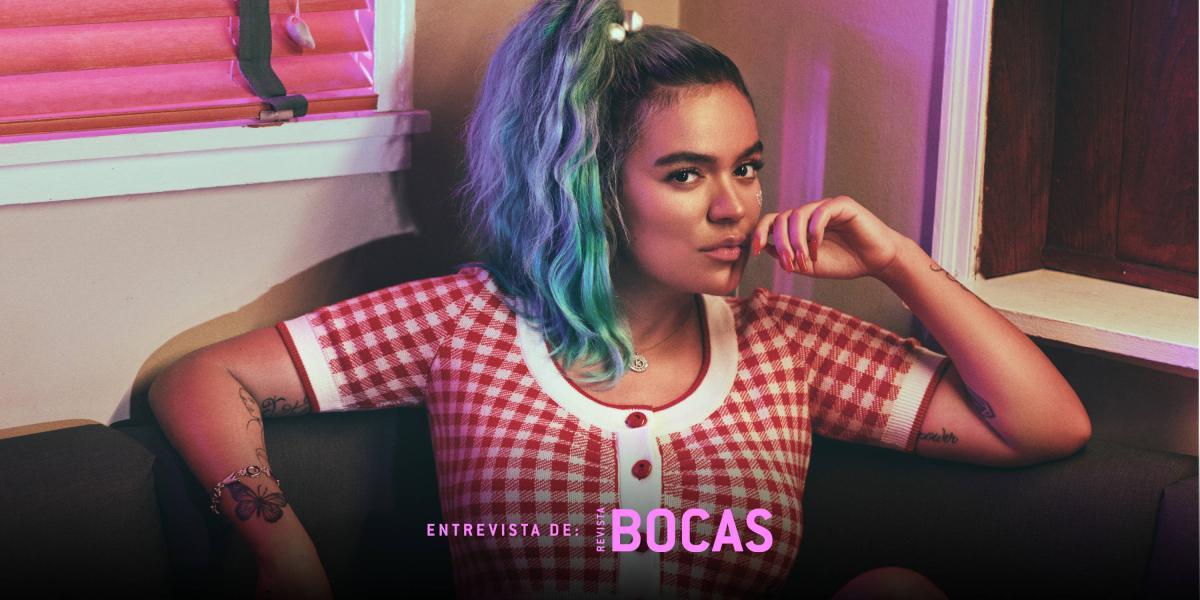
Carolina Giraldo Navarro (14 de febrero de 1991) nació y se crió en Medellín. Hija de una familia clase media acomodada se convirtió en el proyecto familiar que alcanzaría el lugar de la latina #1 en el mundo.
Foto:
Interview with the Colombian singer who, due to her success, is already a world-class artist.
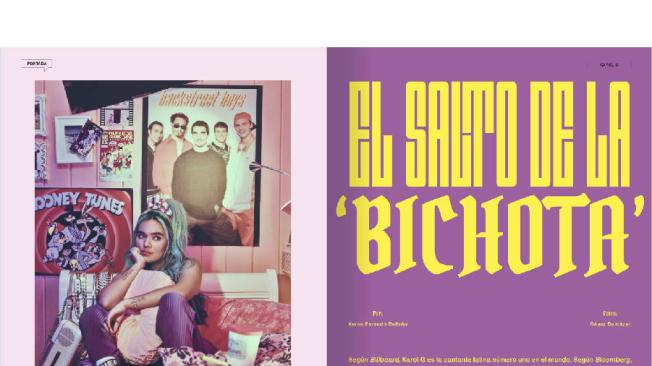
Apertura de la entrevista de Karol G en la edición impresa de Revista Bocas. Edición 104, de marzo - abril de 2021.
Foto:
Compartir
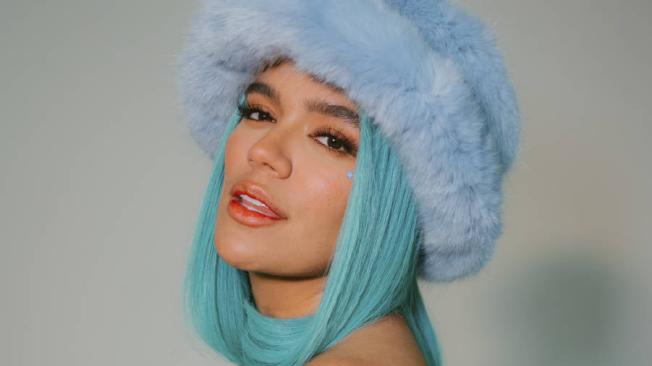
En 2018, la colombiana ganó el Grammy Latino a mejor nuevo artistas. Y en 2020, su canción Tusa, que hace parte de su nuevo álbum KG0516 (2021), debutó como #1 en el listado Hot Latin Song de Billboard.
Foto:
Compartir
There is a video of you from 1996 singing “Eva María se fue buscando el sol de la playa”, while your father sets the rhythm with a vallenata box. Were you like a little Claudia de Colombia in your childhood?
Back then in your house there was a heavy influence from boleros and popular music ...
But, before becoming a singer, you wanted to be a motocross rider, right?
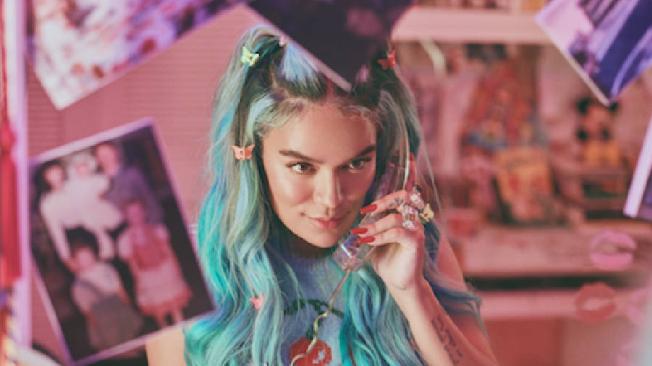
Karol G fue a un colegio religioso y tuvo una crianza conservadora. En Medellín, durante su adolescencia, conoció el reguetón y desde ese momento supo que sería el género musical de su carrera.
Foto:
Compartir
Back at your school you were the best in music class, right?
It was a religious and all-girls school in Medellin, did you ever rebel against the type of education you received?
How? Tell us about that.
How was your life in your neighborhood?
Is it true that for your 15th birthday the theme was Tinkerbelle?
Was it back then that you found reggaeton?
When you were fourteen, you auditioned for the 'XS Factor'. How was your audition and who took you there?
At that time, you were a student at the music children group at the University of Antioquia, in Medellín.
And then you ended up studying undergraduate music at the same university. What was the most life changing thing about attending a public university?
Did you graduate?
How did you get in that university?
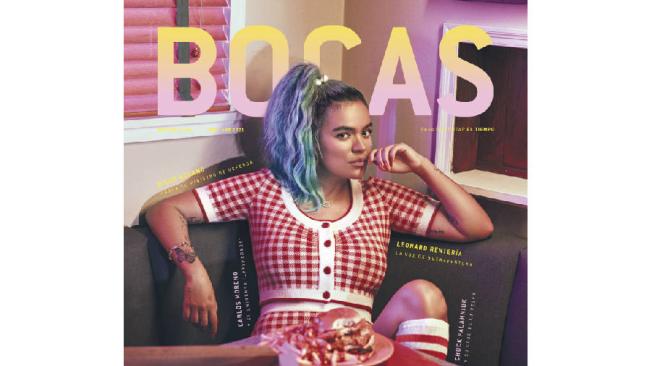
La cantante colombiana es la portada de Revista BOCAS en su edición 104, de marzo de 2021.
Foto:
Compartir
There is a very old YouTube channel, CaritoGCol, where you uploaded covers of songs that you recorded at home. In those videos you were much closer to pop than to any other genre.
While you managed to find your place as an artist of the urban genre, you did other things, such as voices for commercials. How did you get that job?
During a television interview you said that you and your dad decided to “take the slow road” for your career. What did you mean when you said that?
What is your mother's story about, when, on a trip to the United States, she took your CDs door-to-door to record labels?
Your dad also tells a story, but with Andrés Calamaro and the song Mil horas, which you wanted to use in one of your songs ...
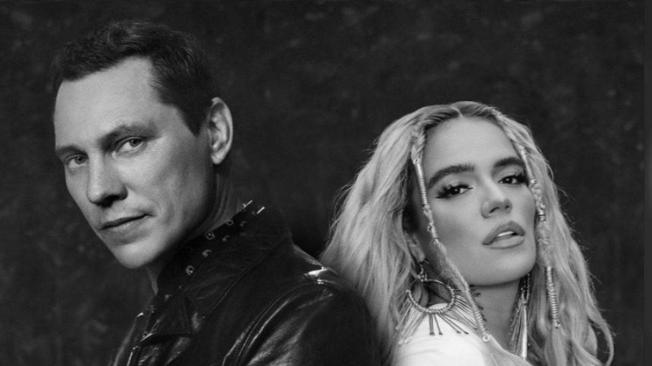
Karol G y el Tiesto lanzarán una canción próximamente.
Foto:
Compartir
Let's talk about the international evolution of your career, about 2016, when you became part of the Universal artist staff. Do you remember how that process was?
You were the first woman in reggaeton to make songs with the great male artists of the genre such as Nicky Jam, Ozuna, J Balvin, Bad Bunny. Tell us about that experience.
At your 2020 Grammy performance, you sang Tusa with an all-female band. You reminded me of Patricia Tehran and the Diosas del Vallenato thirty years ago, where all of them, even the accordionist, were women.
More news

DESCARGA LA APP EL TIEMPO
Personaliza, descubre e informate.
Nuestro mundo

Cuál es la ciudad más feliz de Colombia, según la inteligencia artificial
Los informes consideraron el nivel de satisfacción con la vida, la salud, trabajo, seguridad y más.

Estas son las ciudades más lindas de Colombia, según la inteligencia artificial
Estas son las siete ciudades que, según ChatGPT, descatacan de todo Colombia.

Irán e Israel, de aliados a enemigos jurados: los hechos que han marcado la tensión entre ambos países
Estos es lo que ha pasado entre ambos países en las últimas décadas.

Los misiles de Irán a Israel impactarán en Altos del Golán y desierto de Negev, según NYT
Estados Unidos cree que se lanzarán entre 400 y 500 drones y misiles desde Irak, Siria y el sur del Líbano.

Revelador video aéreo muestra el estado crítico del embalse San Rafael: ‘No mejora sus condiciones’
El Distrito ha adoptado medidas para que se reduzca el consumo de agua en Bogotá.

Cortes de luz en Bogotá para este martes 16 de abril: direcciones y hora de restablecimiento
Enel continúa con los trabajos programados de mantenimiento y reparación en sectores de la ciudad.

Descartan decretar Estado de prevención en Medellín por mala calidad del aire
En los últimos días la mayoría de estaciones que miden la calidad del aire están en nivel naranja.

Con puente reparado se restablece la movilidad entre Medellín y Santa Fe de Antioquia
El consorcio Devimar anunció el final de las obras de reparación en el puente El Tonusco

Con millonaria inversión miden niveles de ríos para evitar racionamiento en el Valle
Una red de monitoreo en tiempo real será la encargada de verificar la situación en ríos del Valle.

Conductor en Cali, aparentemente ebrio, se voló de los agentes de tránsito, fue perseguido y capturado
La escena ha causado todo tipo de comentarios, pues el hombre se negó a hacer prueba de alcoholemia. Esto pasó.

Momento incómodo: alcalde en Atlántico sufrió percance con sus pantalones durante discurso
Jorge Elías Chams Chams se tomó el momento con humor.

Según cifras, el fraude de energía en Atlántico, Magdalena y La Guajira ha disminuido
Proponen una reforma legislativa a la política criminal para combatir el robo de energía.

Más de 400 desplazados por enfrentamientos entre grupos armados en el sur del Cauca
Las familias han tenido que refugiarse en el coliseo municipal del municipio de Argelia.

Queman maquinaria amarilla del consorcio que realiza obras en Bolívar, Cauca
Los elementos habían sido retenidos en días pasados por el ELN.

Google abre oficinas en El Salvador; importante financiación para mujeres emprendedoras
La compañía indicó que esta apertura es parte del acuerdo firmado en 2023 con el Gobierno salvadoreño.

Atención: periodista Carlos Julio Rojas fue detenido por hombres vestidos de negro en Venezuela
Al comunicador se lo llevaron desconocidos cuando estaba en La Candelaria, en Caracas.

'Venezuela seguirá su marcha económica con o sin licencias de EE. UU.': Maduro ante posible regreso de sanciones
El presidente reveló que este lunes sostuvo una videoconferencia con funcionarios de EE. UU.

¿Por qué Venezuela insiste en que el Tren de Aragua no existe y que es una 'ficción creada por la mediática internacional'?
Colombia y otros países han reportado la captura de integrantes de ese grupo. Pero Caracas asegura que fue desmantelado.

Así fue la primera jornada del histórico juicio contra el expresidente Donald Trump en Nueva York
El primer expresidente estadounidense que se sienta en el banquillo de los acusados en un caso penal dice que su proceso es una ‘persecución política’.

Hallan el cuerpo de otra de las víctimas del accidente en el puente de Baltimore, en EE. UU.
Ya son cuatro los cuerpos recuperados por las autoridades tras el accidente del pasado 26 de marzo.

Zelenski pide apoyar a Ucrania de la misma forma en que se protegió a Israel de Irán
El mandatario reiteró la importancia de fortalecer la defensa aérea de su país ante los ataques rusos.

El príncipe Harry no podrá apelar decisión judicial sobre su seguridad en Reino Unido
Un dictamen en 2020 estableció que ni el duque ni su familia recibirían el mismo grado de protección cuando visitaran el país.

Moderna suspende el plan para construir en Kenia una fábrica de vacunas para África
Moderna pretendía producir en esa planta hasta 500 millones de dosis de vacunas al año para África.

Bailarín colombiano, de 21 años, murió en Egipto tras presentar fuerte dolor de cabeza: esto se sabe
La agencia de baile con la que viajó el joven no se ha pronunciado frente a la posible negligencia.

Israel prepara evacuación de civiles en Rafah para dar inicio a su invasión en el sur de Gaza
Fuerzas israelíes sostienen que la incursión permitirá eliminar distintos batallones de Hamás que se esconden en la zona.

Jefe del Estado Mayor de Israel asegura que habrá una 'respuesta' al ataque de Irán
Medios israelíes aseguran que el gobierno evalúa un ataque militar contra Irán.
Tras el ataque de Irán, Israel bombardea Gaza mientras el mundo pide calma en Oriente Próximo

Diplomacia y advertencias: así es cómo Irán busca contener las repercusiones de su ataque contra Israel

EN VIVO | Estados Unidos dijo que Irán no les informó sobre el ataque a Israel: 'Esta noción es ridícula'

Irán afirma que capturó buque vinculado a Israel por violación de las normas marítimas

Cuatro soldados israelíes heridos por una explosión en la frontera norte de Israel

Israel evalúa cómo responder tras el ataque masivo iraní: ¿qué opciones hay sobre la mesa?

Así son los misiles y drones que Irán usó para atacar a Israel

Estos son los aliados de Irán en Oriente Medio que también desafían a Israel

Así funciona la 'Cúpula de hierro', el principal escudo que utilizó Israel contra los ataques de Irán

Israel asegura que interceptó el 99 % de los misiles y drones iraníes: este es el balance de ambos países

Papa Francisco pide cesar la violencia tras ataque de Irán a Israel: 'Sigo en oración, con preocupación y también dolor'

Israel bombardea Líbano en medio de la creciente tensión tras el ataque iraní

¿Por qué Irán lanzó una lluvia de misiles y drones contra Israel y qué puede pasar tras el ataque?

El peligroso precedente que sientan los recientes ataques a cuerpos diplomáticos

Más de 200 drones y misiles disparados contra Israel: el balance preliminar del ataque iraní

Consejo de Seguridad de la ONU se reunirá este domingo tras ataque de Irán a Israel

Irán e Israel, de aliados a enemigos jurados: los hechos que han marcado la tensión entre ambos países

Irán justifica ataque contra Israel con el artículo 51 de la carta de la ONU: 'Es legítima defensa'


Juicio Daniel Sancho: abogado de Arrieta revela qué pasaría si pide perdón a la familia
La defensa de la familia del cirujano, Juan Gonzalo Ospina, rechazó cualquier negociación.

Rayos y lluvias torrenciales en Pakistán dejan como saldo más de 20 muertos
Las lluvias torrenciales causaron inundaciones en la capital provincial.
Jaque mate al Hong Kong que fue

Hong Kong investiga caso de infección de zika y dengue en viajero procedente de Tailandia

Condenan a pena de muerte a magnate vietnamita por uno de los mayores fraudes

Vietnam condena a muerte a millonaria empresaria por fraude masivo de 27.000 millones de dólares

El juicio contra Daniel Sancho continúa con los testimonios de la Policía este 11 de abril

Japón busca ampliar alianzas de seguridad con Estados Unidos para hacer frente al 'expansionismo chino'

Juicio contra Daniel Sancho por asesinato de Edwin Arrieta: La compra de cuchillos y el alquiler de un kayak

Rodolfo Sancho pide 'respeto' durante su asistencia en juicio de su hijo, Daniel Sancho

Alrededor de 11 muertos dejó un accidente de un bus en una mina en el centro de la India

Incendio en edificio residencial de Hong Kong deja al menos 5 muertos y más de 20 heridos

A puerta cerrada y sin medios: las claves del inicio del juicio contra Daniel Sancho por asesinato del colombiano Edwin Arrieta

Rodolfo Sancho contó cómo se enteró de que su hijo Daniel había asesinado a Edwin Arrieta

China y Rusia: puntos claves del encuentro del presidente Xi Jinping y el canciller Serguéi Lavrov

Equipo chino trasplanta con éxito riñón genéticamente modificado de cerdo a cuerpo humano

El juez encargado del caso de Edwin Arrieta prohíbe que se informe sobre el juicio

Comenzó juicio en Tailandia contra Daniel Sancho, presunto responsable del asesinato de Edwin Arrieta

Más de 50 testigos declararán en juicio a Daniel Sancho por muerte de médico colombiano

Daniel Sancho declarará el 25 de abril en juicio en su contra por asesinato del cirujano colombiano Edwin Arrieta en Tailandia


Ataque en iglesia de Sídney fue un acto terrorista, según policía australiana
Según las autoridades, el atacante no figuraba en ninguna lista de vigilancia terrorista.

Nuevo caso de violencia en Australia: un sacerdote y varias personas apuñaladas durante una misa en Sídney
Se trata del segundo hecho de violencia de este tipo que vive Australia en pocos días.
Policía identifica al autor del apuñalamiento en un centro comercial en Sídney: ¿qué se sabe?

La Unión Europea condena enérgicamente el 'inaceptable' ataque de Irán contra Israel

Videos: así fueron los momentos de pánico en Sídney, Australia, cuando atacante persiguió a víctimas

Lo que se sabe sobre el ataque con cuchillo en Sídney en el que murieron seis personas

Al menos cinco personas mueren apuñaladas en un centro comercial en Australia

Estas son las increíbles nuevas pinturas de 2.000 años de antigüedad encontradas en Pompeya

Científicos identifican un posible brote de gripe aviar letal en la Antártida

Visados de oro: ¿en qué países se puede acceder a este mecanismo para obtener la residencia?

¿Viviría y trabajaría en Nueva Zelanda? Conozca la nueva normativa, según inmigración

Cuál es el origen de la rivalidad entre Israel e Irán y cómo la guerra en Gaza la está intensificando

5 ciudades turísticas que están haciendo del mundo un lugar mejor al ser sostenibles

Histórico: Consejo de Derechos Humanos de la ONU aprueba resolución sobre la intersexualidad, ¿de qué trata?

'No es broma': por qué Botsuana amenaza con enviar 20.000 elefantes a Alemania

Los momentos de pánico en Taiwán por el terremoto de 7,4: 'Es el más fuerte en 25 años'

Forbes revela el club de los US$ 100.000 millones: estos son los más ricos del mundo

La antigua maravilla de Medio Oriente, en el noroeste de Arabia Saudita, que era inaccesible hasta ahora

Fuerza Quds: así opera el grupo de élite de Irán del general Zahedi, asesinado en Damasco en un ataque atribuido a Israel

'Espero que me arresten': el desafío de la autora de Harry Potter a la nueva ley antiodio en Escocia

Horóscopo
Encuentra acá todos los signos del zodiaco. Tenemos para ti consejos de amor, finanzas y muchas cosas más.
Crucigrama
Pon a prueba tus conocimientos con el crucigrama de EL TIEMPO











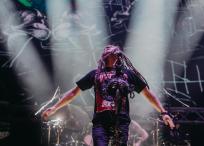


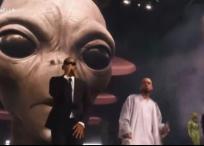
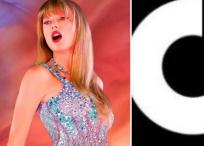
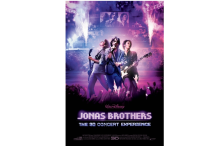
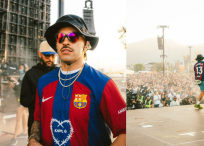
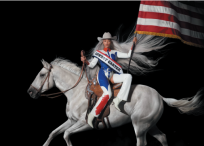











































%20(2).jpg)


